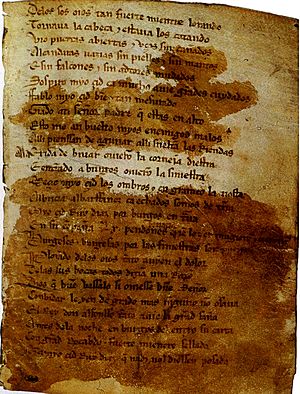Cantar de mio Cid facts for kids
Quick facts for kids Cantar de mio Cid |
|
|---|---|
| Poem of my Cid | |
 |
|
| Also known as | Poema de mio Cid (Poem of my Cid) |
| Author(s) | Unknown |
| Language | Old Spanish |
| Date | Composed sometime between 1140 and 1207 |
| Manuscript(s) | Unique manuscript. National Library of Spain, Ms. Sig. v.7–17. |
| Genre | Cantar de gesta |
| Verse form | Anisosyllabic with assonant rhyme |
| Length | 3730 verses |
El Cantar de mio Cid, which means "The Song of my Cid", is Spain's oldest known epic poem. It's also called The Poem of the Cid. This amazing story is based on real events. It tells about a brave Castilian hero named El Cid. The poem is set during the Reconquista, a long period when Christian kingdoms took back control of Spain from the Moors. Many people consider it a very important national story for Spain.
The only copy of this ancient work is a medieval manuscript. You can find it today at the Spanish National Library.
Contents
What is the Cantar de mio Cid?
The Cantar de mio Cid is a type of long poem called a cantar de gesta. This means "song of deeds" or "song of heroic acts." These poems were popular in medieval Europe. They told exciting stories about heroes and their adventures. The Cantar de mio Cid is special because it's the only one from Spain that has survived almost completely.
The poem has 3,730 lines of verse. It was likely sung or recited by traveling performers. These performers were called juglares. They would entertain people in castles and towns. The poem was probably written down sometime between 1140 and 1207. We don't know who the original author was.
Who was El Cid?
The hero of the poem is Rodrigo Díaz de Vivar. People knew him as El Cid. This name comes from the Arabic word sidi, meaning "lord." He was a real knight and military leader. He lived in Spain during the 11th century. This was a time of many conflicts. Christian kingdoms and Muslim rulers often fought for control of land.
El Cid was known for his bravery and skill in battle. He fought for both Christian and Muslim rulers at different times. He was a very clever strategist. He was also known for his honor and loyalty. The poem shows him as a perfect knight. He always tries to do what is right.
Why is this Poem Important?
The Cantar de mio Cid is very important for several reasons. First, it's the oldest surviving epic poem in the Old Spanish language. It gives us a look into how the language was spoken long ago. Second, it tells us a lot about life in medieval Spain. It shows the customs, values, and challenges of the time.
Third, it celebrates a national hero. El Cid represents courage, honor, and determination. These are qualities that were highly valued. The poem helped shape Spain's national identity. It reminds people of a time when heroes fought for their land and beliefs.
What is the Story About?
The poem is divided into three main parts. Each part tells a different stage of El Cid's journey.
The Cid's Exile
The story begins with El Cid being unfairly exiled. This means he is forced to leave his home. King Alfonso VI of Castile banishes him. El Cid has to leave his family and lands behind. He gathers a small group of loyal followers. They ride out of Castile. This part shows his sadness but also his strong spirit.
To regain his honor, El Cid must earn the king's favor again. He does this by fighting against the Moors. He wins many battles and captures rich treasures. He always sends a share of his winnings to the king. This shows his loyalty.
The Cid's Weddings
In the second part, El Cid becomes very powerful. He conquers the city of Valencia. This is a huge victory. He sends for his wife, Doña Jimena, and his daughters, Doña Elvira and Doña Sol. They join him in Valencia. The king is impressed by El Cid's success. He forgives El Cid.
The king then arranges for El Cid's daughters to marry. They marry the Infantes de Carrión. These are two noblemen from a powerful family. Everyone believes this will bring great honor to El Cid's family.
The Cid's Dishonor and Justice
The third part is about a terrible event. The Infantes de Carrión are not as brave as they pretend. They are cowards. They are also very greedy. They become jealous of El Cid's fame. They decide to take revenge on his daughters. They beat them badly and leave them for dead.
El Cid is heartbroken and angry. He seeks justice from the king. The king calls a special court. In the end, the Infantes are defeated in a duel. El Cid's daughters are then married to princes from Navarre and Aragon. This restores their honor. It also brings even greater glory to El Cid's family.
Images for kids
See also
 In Spanish: Cantar de mio Cid para niños
In Spanish: Cantar de mio Cid para niños


